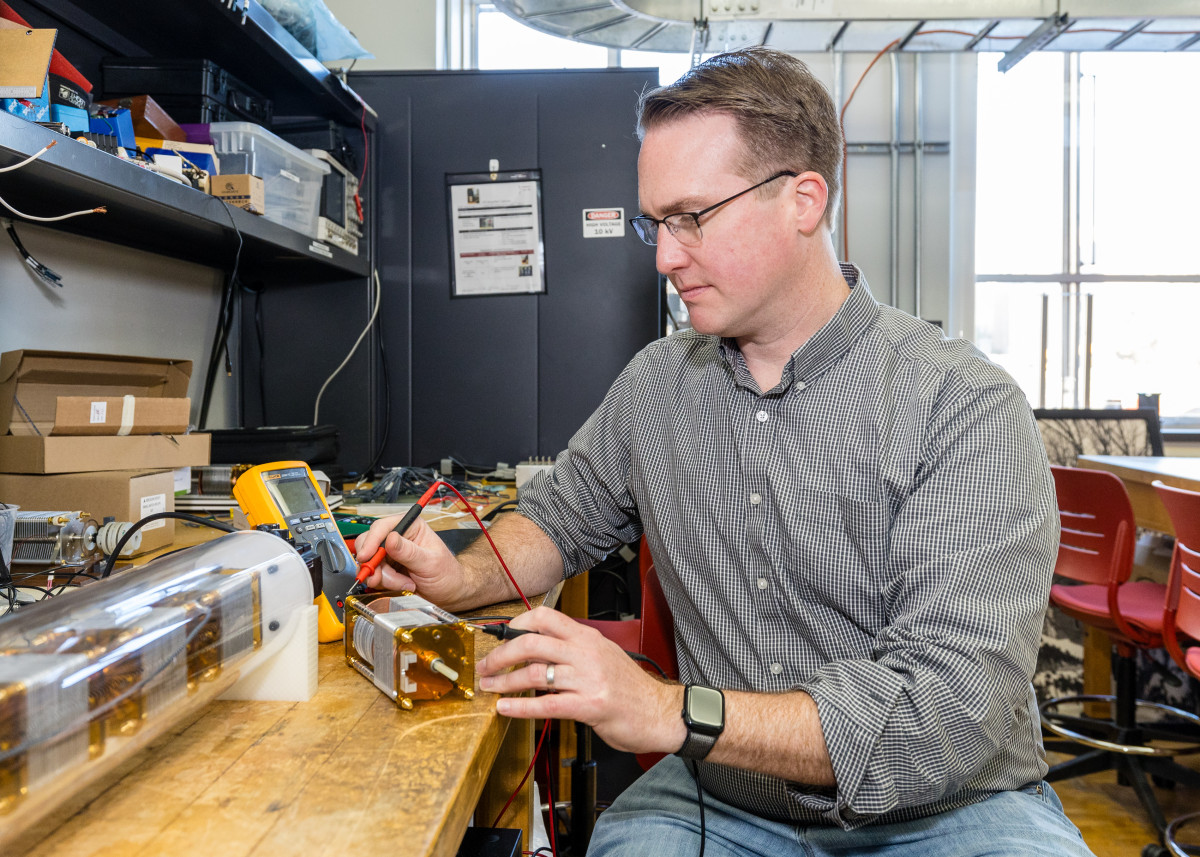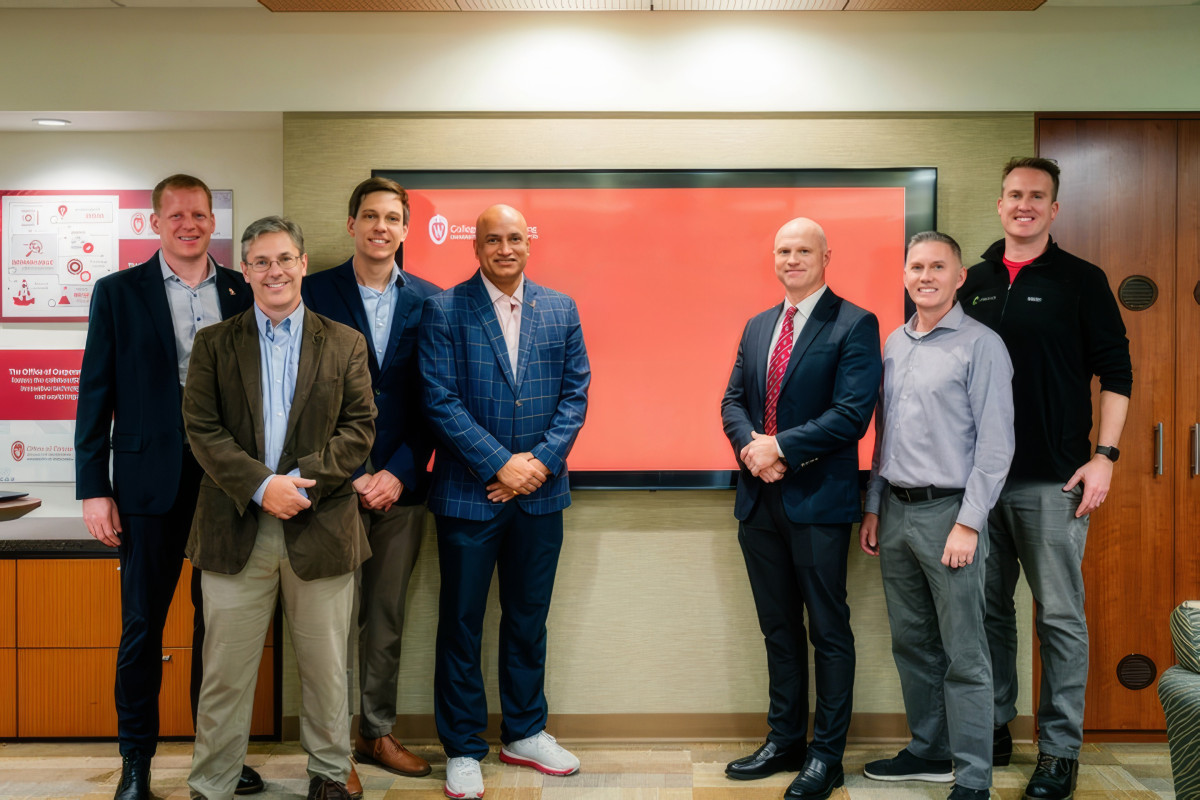Badger Tech Foundry, first “spoke” in the Wisconsin Entrepreneurship Hub, focused on helping early-career researchers become serial entrepreneurs

At the University of Wisconsin–Madison, groundbreaking ideas are born every day.
The Wisconsin Entrepreneurship Hub, a Chancellor’s initiative started earlier this year, is working to help translate ideas into opportunities for entrepreneurial students, staff and faculty by creating a founder-first ecosystem at UW–Madison that develops talent and helps launch entrepreneurial careers.
Now, the Badger Tech Foundry, launched by the College of Engineering, has become the first spoke in the Hub, helping ensure ideas born in the lab become companies, careers and catalysts for change. The Badger Tech Foundry is a founder development program recruiting graduate students and postdoctoral researchers to UW–Madison, training them to launch companies and become serial entrepreneurs.
“At UW–Madison, we’re driven to develop ideas that change the world,” says Foundry Director William Murphy, a professor of biomedical engineering and orthopedics and rehabilitation. “This initiative is about making sure that happens by supporting talented young researchers and helping them start their own companies rooted in ‘deep tech’ expertise.”
Deep tech refers to innovations that are rooted in science and engineering. They are complex, often capital-intensive efforts that tend to involve intellectual property and require specific expertise, such as in semiconductors, or in specialized materials for medical implants.
Bridging gaps to advance entrepreneurship
Murphy, a seasoned entrepreneur who has spun out multiple biotech startups, sees the Foundry as a launchpad for a new generation of entrepreneurs. “We have the intellectual property and intellectual capital to anchor far more companies than we currently do,” he says. “There are 150 steps between wanting to launch a company and actually doing it. The Badger Tech Foundry exists to bridge that gap.”
Many postdoctoral researchers, graduate students and undergraduates are passionate about becoming entrepreneurs yet need the training and networks to take the leap. The Badger Tech Foundry will receive equity in the companies it helps launch, reinvesting in future ventures and expanding its reach.
Devesh Ranjan, who became Grainger Dean of the College of Engineering in June 2025, is eager to bring more UW–Madison innovations to market and says the support of the Wisconsin Entrepreneurship Hub will help the Badger Tech Foundry connect to best practices and resources cultivated across campus.
“It is our charge and our responsibility according to the Wisconsin Idea to advance the innovative solutions we are developing into society for the benefit of our communities,” Ranjan says. “The Badger Tech Foundry provides tremendous opportunities to engage the next generation of founders, drive economic growth, create and build stronger partnerships, and move discoveries beyond our college and our campus, where they can truly make a difference in people’s lives.”
Murphy and Badger Tech Foundry Executive Director John Krutty will tap a growing pool of science and engineering trainees who have technical expertise and desire to be entrepreneurs. Those trainees will be connected to specific areas, or technology verticals, like energy, biotech and advanced materials where research is ripe for commercialization.
“The Foundry will support technologies that are ready technically and that have an identified market opportunity,” Murphy explains.
By the end of a focused year-long training program, the early entrepreneurs-in-residence — three of whom already are on board — will be ready to start a company. Graduate students, or “innovators in training,” will support these ventures by helping shape product profiles, identify and address challenges and refine technologies.
The goal is to create a pipeline of founders who will launch multiple companies over their careers, fueling Madison’s overall entrepreneurial ecosystem and attracting investor interest.
“We aim to recruit entrepreneurs and help them launch their careers,” says Jon Eckhardt, special advisor to UW–Madison Chancellor Jennifer Mnookin for Entrepreneurship and Pyle Bascom Professor in Business Leadership at the Wisconsin School of Business. “For us to achieve our objectives, we need faculty like Bill who excel in technology and business. To welcome the Badger Tech Foundry to the Wisconsin Entrepreneurship Hub represents a significant step toward helping UW–Madison become a leading destination for entrepreneurs and entrepreneurship.”
The Foundry is seeking to grow its base of external partners, including donors and early-stage investors and advanced-tech serial entrepreneurs, as well as organizations interested in supporting trainees and building new technology verticals.
“These ‘Friends of the Foundry’ will be part of the community that helps our startups succeed,” says Murphy. “We’ve already had multiple groups ask to hear pitches from every company we create.”

Creating an entrepreneurial ecosystem
Six years ago, Murphy founded UW–Madison’s successful Forward BIO Institute. Since its founding alongside University Research Park shared incubator space Forward BioLabs — itself a hotbed for startup companies — Forward BIO has trained more than 200 students, and onboarded and advanced more than 30 technologies, which led to four new companies. This helped inspire the Badger Tech Foundry; Forward BIO will now become one of the Foundry’s technology verticals.
“The Badger Tech Foundry provides opportunity for current graduate students and postdocs already in Wisconsin to take their ideas to the next level, and even on to lead successful companies,” says Eckhardt. “It also creates a system for the university to recruit talent from across the U.S. and globe.”
The Foundry will serve as a resource for others across the university looking to establish technology verticals, and it will also leverage expertise across campus. The Technology Entrepreneurship Office based in the College of Engineering will provide targeted education, and the Foundry also intends to partner with the Wisconsin Alumni Research Foundation (WARF), UW–Madison’s patent and licensing organization, which offers programs to help inventors increase the chances of success for their technologies, as well as to provide seed and growth funding.
“We see WARF as a critical partner and a steadfast supporter of what we’re trying to do,” says Murphy, who notes the Foundry is poised to help move many more UW–Madison innovations patented through WARF out into the world.
“Too many really exciting technologies developed in academia never reach the public,” says Murphy, who holds a Harvey D. Spangler Professorship in engineering. “The Badger Tech Foundry is about building a bridge between discovery and deployment. We are increasing the value and impact of our intellectual property—and creating opportunities that will shape the future.”
UW–Madison is expected to announce the hire of the Associate Vice Chancellor and Executive Director of the Wisconsin Entrepreneurship Hub soon.
